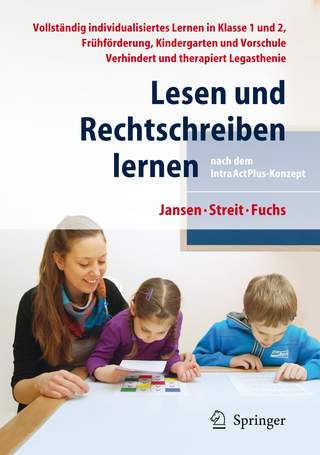
Moving Forward in the Study of Temperament and Early Education Outcomes
Routledge (Verlag)
978-1-032-08960-7 (ISBN)
This book furthers understanding of how child temperament is linked to educational outcomes through mediating and moderating factors.
As the importance of socio-emotional development for educational outcomes is increasingly recognized, understanding the influence that children’s temperament—which includes their emotional reactivity and regulation of emotions, cognitions, and behaviors—can have on educational factors, such as school readiness and academic achievement, is crucial. First, the chapters in this book examine pathways connecting temperament with educational outcomes; for example, one study reports that toddler negative affect predicted executive functioning, which then predicted achievement at age six. The second way that chapters in this book examine links between temperament and education is by identifying factors that make associations between temperament and educational outcomes more salient; for example, findings from one study show that shyness and negative emotion were more strongly associated with lower academic achievement only when children received fewer than nine hours of sleep each night, highlighting the importance of sleep.
By examining pathways through which temperament exerts effects on educational outcomes (i.e., mediators), or factors that modify associations between temperament and educational outcomes (i.e., moderators), the potential for interventions aimed at improving early educational outcomes can be fully realized.
This book was originally published as a special issue of Early Education and Development.
Cynthia L. Smith is an Associate Professor and Director of Graduate Studies in Human Development and Family Science at Virginia Tech, USA, where she leads the Children’s Emotions Lab. David J. Bridgett is an Associate Professor of Clinical Psychology at Northern Illinois University, USA, where he directs the Emotion Regulation and Temperament Laboratory.
1. Moving Forward in the Study of Temperament and Early Education Outcomes: Mediating and Moderating Factors 2. Sleep Duration Moderates the Association Between Children’s Temperament and Academic Achievement 3. Executive Function Mediates the Association Between Toddler Negative Affectivity and Early Academic Achievement 4. Indirect Effects of Temperament on Social Competence via Emotion Understanding 5. Linking Shyness With Social and School Adjustment in Early Childhood: The Moderating Role of Inhibitory Control 6. Instructional Support and Academic Skills: Impacts of INSIGHTS in Classrooms With Shy Children 7. Maternal Responsiveness Protects Exuberant Toddlers From Experiencing Behavior Problems in Kindergarten 8. Early Language Development in Context: Interactions Between Infant Temperament and Parenting Characteristics 9. Temperamental Anger and Positive Reactivity and the Development of Social Skills: Implications for Academic Competence During Preadolescence 10. Academic Resilience Despite Early Academic Adversity: A Three-Wave Longitudinal Study on Regulation-Related Resiliency, Interpersonal Relationships, and Achievement in First to Third Grade 11. Kindergarten School Engagement: Linking Early Temperament and Academic Achievement at the Transition to School
| Erscheinungsdatum | 01.07.2021 |
|---|---|
| Verlagsort | London |
| Sprache | englisch |
| Maße | 174 x 246 mm |
| Gewicht | 349 g |
| Themenwelt | Geisteswissenschaften ► Psychologie ► Pädagogische Psychologie |
| Sozialwissenschaften ► Pädagogik ► Allgemeines / Lexika | |
| Sozialwissenschaften ► Pädagogik ► Bildungstheorie | |
| Sozialwissenschaften ► Pädagogik ► Vorschulpädagogik | |
| ISBN-10 | 1-032-08960-1 / 1032089601 |
| ISBN-13 | 978-1-032-08960-7 / 9781032089607 |
| Zustand | Neuware |
| Informationen gemäß Produktsicherheitsverordnung (GPSR) | |
| Haben Sie eine Frage zum Produkt? |
aus dem Bereich


